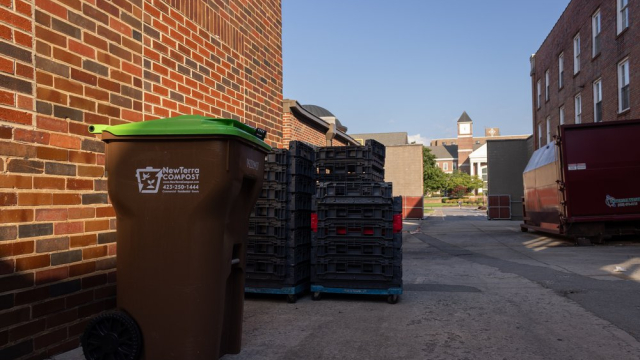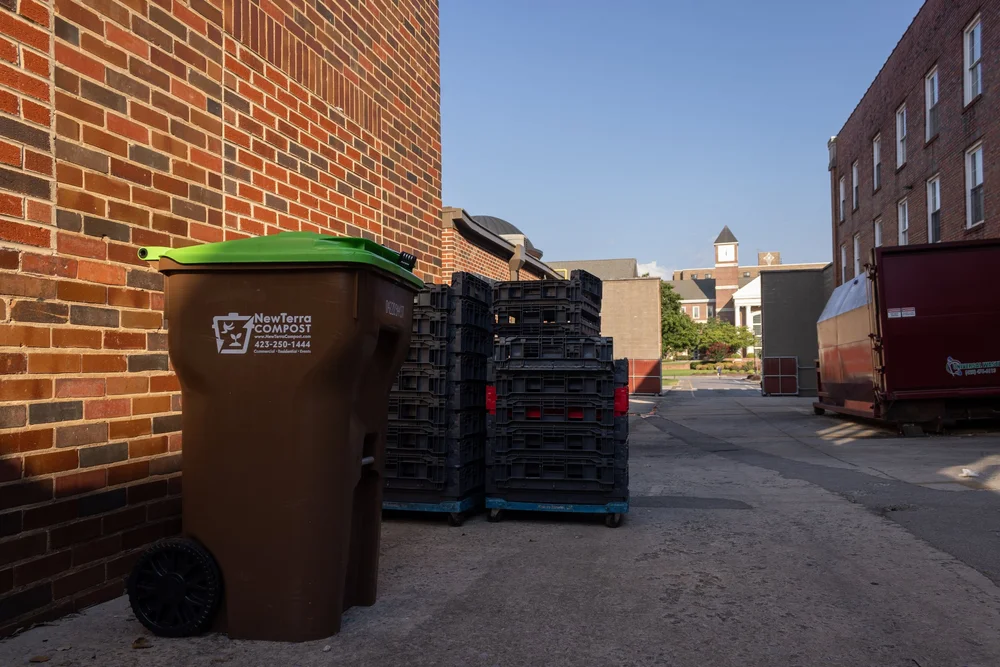Going Green: Lee University partners with NewTerra in to reduce food waste
Due to the recent concern surrounding food waste, Lee University’s food
service, Sodexo, has partnered with a locally owned company in order to
reduce their food waste.

Going Green: Lee University partners with NewTerra in to reduce food waste
Due to the recent concern surrounding food waste, Lee University's food service, Sodexo, has partnered with a locally owned company in order to reduce their food waste.
According to the USDA, food waste makes up one third of the food meant for consumption in the United States. It also makes up 22 - 24% of solid food waste in landfills, a report by The U.S. Environmental Protection Agency (EPA) reveals. Lee University is responding to this environmental concern with a creative partnership.
In March 2022, Lee University Dining partnered with NewTerra, a company based in Georgia, to compost the food from The Deacon Jones Dining Hall. The leftovers, or waste, left by students are gathered to be composted at the NewTerra Cleveland branch.
NewTerra is committed to going even further with their compost mission.
“We want to be wherever food is found. We want students to see that they can make a difference when they sort out their own food and compost it,” said Melanie McCarley, the head of marketing at the Cleveland branch of NewTerra. “If we can have students see the change they make, we think that there would be more of a push to recycle.”
“Since March, Lee has composted about 1,800 pounds of food residue,” McCarley said.

Photo by photographer Riley Evans.
Sodexo, the company behind Lee Dining, is nothing but enthusiastic about this partnership. Bruce Reed, the General Manager at the Deacon Jones Dining Hall, said the partnership was initially suggested by NewTerra. This partnership is valuable to NewTerra, as Lee is a founding member of the Cleveland branch of NewTerra along with Lupi’s Pizza, Misfit Tacos, The Bailey Company, The Press and New Life Community Kitchen.
“Having the student body know about this is so amazing because it is not just a one-off thing that Lee was offered, it was something they planned and is something they are paying for,” McCarley explains.
The move to composting is one that aligns heavily with Sodex’s values as a company. Sodexo is a leader in sustainability in the corporate world, with their annual report from 2021 reporting a 44% reduction in carbon emissions since the 2017 fiscal year. In Reed’s nearly 20 years at Sodexo, he has overseen several schools that have started composting and recycling programs.
The composting system itself works just like a regular waste system. The food residue is collected at the end of the day in biodegradable bags and put in a bin outside of the dining hall to get picked up weekly. Although the system currently offers no monetary benefit over regular waste disposal, there is more that goes into play.
“Because the residue does not need to get flushed down our grease traps, the machines last longer than they would otherwise,” said Reed. “Instead of filling the waste containers with food waste, trash needs to be picked up less often.”
Reed would love to introduce the composting initiative to other areas on campus, but it needs to be able to produce a financial balance. Reed said that the program needs to be able to provide a way to make up for money lost in switching from regular disposal to composting.
“Sodexo has always been a company with sustainability in mind, and the Deacon Jones dining hall is a pilot program to see if the benefit outweighs the cost of expanding on campus,” said Reed.
If the composting ends up offsetting the cost of regular waste disposal, many are hoping that it will continue to spread across campus.

Photo by photographer Riley Evans.
“We hope to grow from just the back of house operations in dining areas to the front areas and eventually to student living spaces. Having students get interested in the idea allows us to try and get them on board for composting in their own kitchens. There is power in numbers, imagine what a school like Lee could do if people composted all over campus?” said McClarey.
Reed suggests for students to “grab one plate of food at a time.” If students try to curb their own waste, it reduces the need to compost as much, and in turn reduces overall waste.
The composting system is not the only way students are able to help the environment. Lee is home to the Creation Care Club, an "environmental club on campus dedicated to Christian environmental stewardship and service that benefits God's creation," says the club's president, Madeline Padgett.
"CCC's mission is to educate the Lee community about environmental issues and Christian stewardship and to provide opportunities for students to be stewards of God’s creation,” said Padgett. “CCC also advocates for environmentally responsible policies and practices on Lee’s campus."
All of these resources are great ways to begin to be more eco-friendly. The CCC has gardening and recycling opportunities every semester, both of which can count for service hours. New Terra offers a 5-gallon bucket for either weekly pick up or drop off for a monthly fee.
To get more information on the Creation Care Club, follow them on their instagram at @leeuccc.